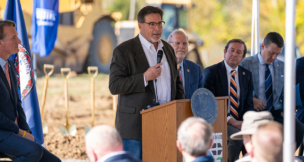Democrat Jay Jones wins race to be Virginia attorney general despite texts endorsing violence
Democrat Jay Jones wins Virginia attorney general race despite backlash over violent 2022 texts, defeating GOP incumbent Jason Miyares.
Updated: Jones, Hashmi win Democratic primaries for AG, lieutenant governor
Virginia state Sen. Ghazala Hashmi wins Democratic nomination for lieutenant governor, with AG nominee Jay Jones rounding out ticket
Trump official urges criminal probe of NY AG over Virginia home purchase
NORFOLK, Va. (AP) — In the summer of 2023, New York Attorney General Letitia James helped her niece buy a modest house in Norfolk, Virginia, by becoming a co-borrower on the mortgage loan. A top housing official in the Trump administration has now seized on a document in that transaction to argue that James should […]
Miyares declares run for 2nd term as Va. AG
Virginia Attorney General Jason Miyares declared Monday he will run for a second term in 2025, leaving Lt. Gov. Winsome Earle-Sears a clear path to the Republican nomination for governor. Gov. Glenn Youngkin, who is prohibited by state law from serving consecutive terms as governor, endorsed both candidates following Miyares’ announcement. A former Virginia Beach […]
Government | Politics 2023: JASON MIYARES
Miyares, whose mother fled communist Cuba in the 1960s for the United States, is the first Hispanic person elected to statewide office in Virginia. He became the state’s attorney general in 2022 after representing part of Virginia Beach in the House of Delegates for six years. Since assuming office from a two-term Democratic AG, Republican […]
Is ESG another CRT?
In January, Virginia Attorney General Jason Miyares joined a group of 24 other state attorneys general in challenging a U.S. Department of Labor rule allowing fiduciaries to consider environmental, social and corporate governance (ESG) criteria such as climate change in making investment decisions for retirement funds. The AGs argued that ESG practices work against investment […]
Richard Cullen to become Youngkin’s counselor
Gov.-elect Glenn Youngkin has selected former Virginia Attorney General Richard Cullen as counselor to the governor. A senior partner and former chairman of McGuireWoods, Cullen will leave Virginia’s largest firm on Jan. 14, the day before Youngkin is sworn in. Cullen joined McGuireWoods in 1977. From 1991 to 1994, he served as U.S. attorney for […]
Va. GOP prepares for nomination convention on Saturday
On Saturday, roughly 54,000 Virginia Republican convention delegates will have the opportunity to choose their party’s 2021 nominees for governor, lieutenant governor and attorney general. Unlike the typical “firehouse convention,” currently prohibited due to COVID-19 precautions, the state GOP has opted for an “unassembled convention” with 39 voting locations open Sa[...]
Nexus Services CEO calls state AGs’ lawsuit ‘a form of retaliation’
Nexus Services Inc., the bonding company being sued by the states of Virginia, Massachusetts and New York, responded Friday with accusations of its own. In a statement, Nexus CEO and President Mike Donovan said that the state attorney generals’ allegations that the company financially preyed on immigrants held in federal detention are “offensive, 100% false […]
Shenandoah County distillery faces environmental violation charges
Maurertown-based Filibuster Distillery LLC and its co-founder, Sid Dilawri, have been indicted on 115 counts of violating State Water Control laws by allegedly dumping more than 40,000 gallons of industrial waste into a Shenandoah County stream, according to the Virginia Office of the Attorney General. The Shenandoah County distillery, Filibuster Barrels LLC and Dilawri were […]
Va. attorney general secures $15.3M settlement for former ITT Tech students
Virginia Attorney General Mark Herring secured an agreement to obtain $15.3 million in debt relief for at least 1,840 former ITT Tech students in Virginia as part of a settlement including 47 additional attorneys general and the federal Consumer Financial Protection Bureau, his office announced Tuesday. The entire settlement is approximately $330 million for 35,000 […]
















